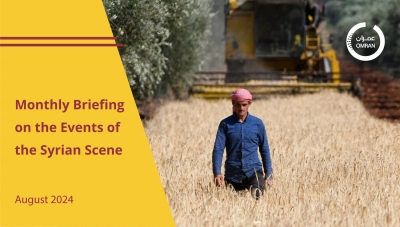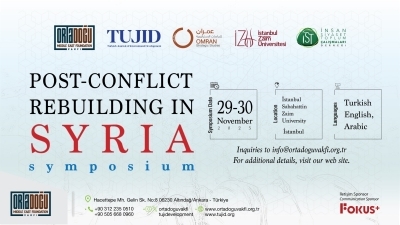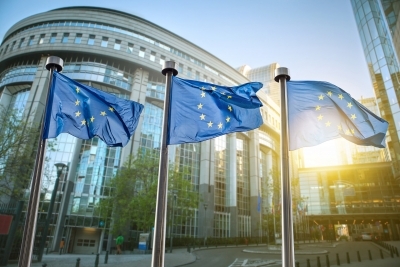General Summary
This report provides an overview of the key political, security, and economic events in Syria during the month of August 2024, examining developments across various levels.
- Politically, the popular movement in Suwayda has persisted for over a year, maintaining its demands for freedom, justice, the release of detainees, and the implementation of UN Security Council Resolution 2254. While international reactions to the normalization process with the Assad regime remain mixed, with some welcoming it and others expressing skepticism, Turkey continues to push forward, driven by domestic pressures, national security needs, and international relations.
- Security, the growing Russian role in containing the increasing tensions in northeastern Syria is becoming more prominent. The renewed cycle of violence claimed the lives of 57 civilians across Syria this month.
- Economically, the continued rise in prices remains one of the most pressing crises affecting the livelihoods of Syrian citizens. The significant drop in wheat production, with over 60% of cultivated land lost, threatens Syria's food security, and raises concerns of potential humanitarian disasters in the medium and long term.
Varied International Reactions to Normalization with the Assad Regime
The popular movement in Suwayda, now marking its one-year anniversary, continues to demand freedom, justice, accountability for human rights violators and war criminals, the release of detainees, and the implementation of UN Security Council Resolution 2254. This ongoing movement reflects a strong determination to achieve political change, despite the security challenges and obstacles imposed by the Assad regime to block any real reform. It is clear that the regime has relied on time to suppress and end the protests, sometimes through indifference and other times through security restrictions. Notably, the regime has refrained from using the same level of repression it employed against the demonstrations during the start of the Syrian revolution in 2011. However, the continued peaceful and growing momentum of the Suwayda movement demonstrates that a political solution that satisfies the Syrian people is the foundation for peace and stability in Syria and the region.
As Turkey's normalization process with the Assad regime continues at a slow pace, international reactions—especially from the United States and Russia—remain mixed. Russian Foreign Minister Sergey Lavrov affirmed Moscow's interest in normalizing relations between its partners in Damascus and Ankara, indicating that a new meeting would take place soon. In contrast, U.S. Ambassador to Turkey Jeff Flake emphasized that the United States would not normalize relations with Bashar al-Assad's regime and would continue to adhere to UN Security Council Resolution 2254. Additionally, Ethan Goldrich, the U.S. Deputy Assistant Secretary of State for Near Eastern Affairs, reminded countries engaging with the Assad regime that such relationships should advance common international goals under Resolution 2254 and serve to improve the conditions for the Syrian people. He stressed that the U.S. does not support normalization efforts by these countries with Assad. Meanwhile, the Turkish Foreign Ministry welcomed Russia’s efforts to restore relations with the Assad regime, confirming that Ankara's efforts to normalize relations with Damascus continue based on "good faith" and without preconditions.
The path to normalization is fraught with challenges, yet Turkey’s urgent priorities—including the burden of the Syrian refugee crisis, national security, counterterrorism, and border security—push Ankara's decision-makers to continue this path despite doubts about its feasibility, high costs, and Western opposition, which has been expressed in statements by representatives at the UN Security Council. A U.S. representative voiced concern over the more than two-year stall in Constitutional Committee meetings and the Assad regime's disregard for the political process called for in Resolution 2254. The U.S. official reiterated that American sanctions would remain in place until tangible and measurable progress is made toward a political solution in line with the international resolution. He also reminded U.S. partners in the region that normalization with Assad would not end or reduce the production of Captagon. Meanwhile, Special Envoy Geir Pedersen warned that escalating security tensions are reaching new and dangerous levels, with rising violence threatening international peace and security.
It appears that Western countries and the United States' efforts to maintain the status quo in the Syrian file are unsatisfactory to neighboring countries, which can no longer bear the burdens of the ongoing conflict that has lasted for over a decade. These countries seek to resolve the conflict in any way that protects their interests and reduces their burdens, even if such a settlement comes at the expense of the Syrian people.
Increasing Russian Role Amid Escalating Security Tensions
August witnessed significant security developments across different areas of control in Syria, with the Syrian Network for Human Rights documenting the deaths of 57 civilians during this month. Regime forces continued their attacks on northwestern Syria, including an assault targeting a Turkish observation point in the de-escalation zones. Additionally, a large explosion in a truck occurred in the city of Azaz, in northern rural Aleppo, killing nine civilians and injuring 13 others. The targeted area came under rocket fire during the rescue and evacuation operations. Meanwhile, tensions continued to rise around the "Abu al-Zendin" crossing, where efforts to open the crossing faced objections from armed groups and civil activists who prevented trucks from passing through.
In Deir Ezzor, eastern Syria, violent clashes lasted for days following large-scale attacks by fighters from the western bank of the Euphrates River, who identified themselves as members of the "Tribal Army." These fighters targeted checkpoints of the Syrian Democratic Forces (SDF) in villages and towns in eastern Deir Ezzor. Both sides engaged in mutual shelling along the banks of the Euphrates, with regime artillery bombarding the villages of Dahla and Jadid Bakara, resulting in a massacre that killed 11 civilians, mostly children and women. In response, SDF forces shelled the opposite bank and, for the first time, conducted a security operation in which their special forces crossed the Euphrates using river barges, supported by drone air cover. This operation resulted in the killing of seven regime soldiers, including an officer with the rank of captain, and the capture of two members of Assad’s Fourth Division.
Two significant developments emerged during these security tensions in Deir Ezzor. First, the SDF explicitly accused regime forces of orchestrating the attacks, directly blaming General Intelligence Chief Hussam Louqa for overseeing the operation. The SDF responded with force, sending a clear message that it is prepared to counter the regime's attempts to destabilize its controlled areas and that relying on regime security forces to undermine the "Autonomous Administration" project is a failed strategy. The second development was Russia's role in mediating the crisis between the two sides. Sergey Alexandrovich Kiselev, the commander of Russian forces in Syria, led a mediation process over several days to prevent further military confrontations in Hasakah and Qamishli and to lift the SDF's siege on regime security zones. Russia’s efforts to expand its influence in northeastern Syria are evident, as it seeks to limit U.S. involvement. Russia has accused the U.S. of increasing tensions in Syria. Alongside its military activities in the east, Russia expressed concern over international coalition movements, particularly U.S. aircraft flights in Russian-controlled areas, with 360 violations of Syrian airspace in the Al-Tanf region reported in August alone, according to the head of the Russian Reconciliation Center. Russian Foreign Minister Sergey Lavrov also warned the Kurds in northeastern Syria against continuing to rely on the United States, reminding them of the Afghanistan scenario.
In southern Syria, Daraa province saw escalations between local armed groups and regime forces in the eastern countryside of Daraa, as well as in the northern countryside. Local groups targeted regime forces in response to kidnappings and arrests of the province’s residents by regime forces. Meanwhile, the regime sought to impose new local reconciliations, which were rejected by the groups that refused to surrender their weapons.
On another front, Israel intensified its airstrikes on Iranian supply lines in eastern and southern rural Homs, near the Lebanese border, in addition to targeting another site in western rural Daraa within regime-controlled areas. Since October, Israel has conducted 180 airstrikes. Despite these attacks, Hezbollah's supply routes and Iran's presence in Syria persist. Iran has successfully entrenched itself in the regime's military, security, and civil institutions over the years, solidifying its presence alongside Hezbollah from Al-Bukamal on the Iraqi border to Al-Qusayr on the Lebanese border. Meanwhile, the U.S. administration appears reluctant to engage in a wide regional war that could significantly jeopardize the gains from its counterterrorism operations and military bases in the region.
Growing Food Security Crisis
The continued rise in prices remains one of the most significant crises burdening Syrian citizens. The primary causes include increasing costs of raw materials, declining agricultural and industrial production, and rampant corruption in the form of bribes and tolls between cities and provinces. Additionally, the drop in purchasing power and financial crises strain the public budget, exacerbated by the regime's poor economic management, including flawed decisions, policies, and relationships with neighboring countries.
Wheat production has significantly declined due to ineffective pricing policies, high production costs, poor-quality seeds, and inadequate fuel distribution to farmers. The indicative price for wheat has proven ineffective, further exacerbated by insufficient rainfall and unfavorable weather conditions. As a result, cultivated wheat areas in Syria have decreased by 60% this season. The reduction in wheat acreage is expected to lead to a shortage of flour, necessitating greater imports and negatively impacting food security.
At the same time, Syria faces difficulties in the flow of goods both locally and regionally. Farmers in the villages of Al-Qusayr, rural Homs, struggle to transport their agricultural produce due to the presence of 22 regime checkpoints and the confiscation of goods by customs under the pretext of smuggling. Farmers are often forced to pay bribes amounting to millions of Syrian pounds to recover their goods and secure passage.
Regionally, delays in Syrian trucks crossing into Jordan continue for the third consecutive month. Entry through the Nasib border crossing is delayed, leading to spoilage of goods and increased costs. Regime officials have accused the Jordanian side of deliberately disrupting traffic at the crossing to promote their own products at the expense of Syrian goods. Syrian truck movement into Jordan faces severe slowdowns due to thorough inspections aimed at preventing drug smuggling. Local markets are also suffering from an increase in smuggling, particularly of milk to Lebanon, which affects the availability of dairy products in Syrian markets and drives prices higher. Although prices have stabilized somewhat in recent months, forecasts indicate further increases due to declining local production.
Simultaneously, the regime and Russia are discussing the use of local currencies in bilateral trade to mitigate the economic impact of Western sanctions on both countries. However, significant obstacles remain, such as the non-convertibility of the ruble and Syrian pound, limiting the effectiveness of such transactions. Moreover, trade between the two countries is imbalanced, with annual trade volumes amounting to $650 million, where the regime imports most of its needs from Russia while exporting limited quantities of agricultural products.
In northeastern Syria, economic problems continue to worsen month by month, particularly due to reduced support from the "Autonomous Administration" to its citizens and rising overall prices. The "Autonomous Administration" has removed subsidies for diesel fuel allocated to commercial electric generators, causing electricity prices to rise. Additionally, the poultry sector in Al-Hasakah has been severely impacted by high temperatures, disease outbreaks, and rising production costs, including the costs of medicine and diesel, which have resulted in the death of large numbers of birds. This has forced some vendors to close their shops due to reduced demand. The military tensions between the "Syrian Democratic Forces" (SDF) and the "Tribal Army" in Deir Ezzor have also cast a shadow over the region's economy. The closure of crossings between SDF-controlled areas and regime-controlled areas has led to a shortage of food supplies and a sharp increase in prices.
In an attempt to alleviate the crisis, the "Agriculture and Irrigation Authority" of the Autonomous Administration announced plans to compensate farmers affected by fires that destroyed vast agricultural areas. These measures include distributing free wheat seeds to affected farmers for the next agricultural season. However, these efforts appear insufficient to address the multiple crises facing the agricultural sector in the region, especially given the rising fuel prices and the overall costs of farming. Overall, these crises reflect a sharp economic decline in northeastern Syria. Worsening the situation is the lack of sufficient government support and the rising cost of living, which place immense pressure on residents already suffering from the consequences of war and ongoing unrest. In these circumstances, a solution remains dependent on achieving comprehensive political and economic stability that can ease the burden on citizens and improve living conditions in these areas.
The economic reality is not much different in northwestern Syria, where Idlib and rural Aleppo are witnessing significant price increases in the energy and basic goods sectors. This adds further pressure on local residents, who are already struggling with the ongoing humanitarian crisis and difficult economic conditions. One of the most notable developments was the decision by "Green Energy," which operates in the electricity sector in Idlib, and the "Syrian-Turkish Electrical Energy Company" (STE) in rural Aleppo, to raise residential and commercial electricity prices. This was justified by the increase in prices from the Turkish supplier providing energy to the region. This decision comes at a time when residents are grappling with declining purchasing power and rising living costs, further increasing the financial burden on families and businesses. Moreover, the poultry market in northwestern Syria is experiencing significant price fluctuations. The price of a ton of chicken in northwestern Syria has dropped by around $300 after the closure of smuggling crossings with areas under the control of the SDF. However, price differences between Idlib and rural Aleppo still range between $300 and $500, attributed to factors such as transportation costs, the availability of feed, and varying security conditions in each region.
Overall, these recent changes highlight significant challenges facing the local economy in northwestern Syria. Rising electricity prices and increasing living costs are putting additional pressure on residents, while productive sectors like poultry are experiencing sharp price fluctuations due to changing security and economic conditions. Without sustainable economic interventions or international support, these crises may continue to negatively affect the region's stability and the lives of its inhabitants.




